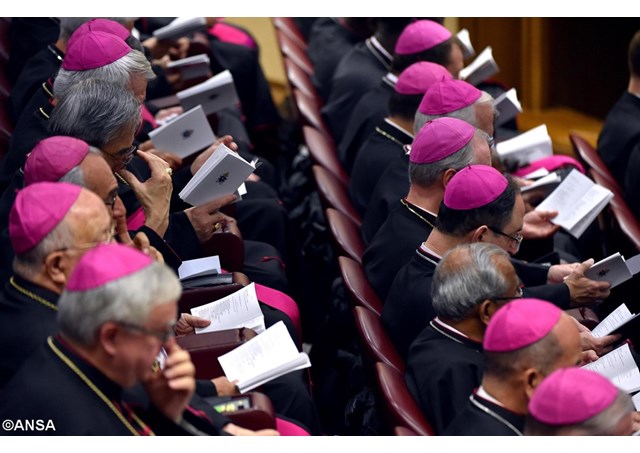
Synod's small groups seek consensus amid diverging visions

(Vatican Radio) Participants at the Synod on the Family have concluded their small group work and presented the results of their discussions on the third and final part of the working document, dedicated to ‘The Mission of the Family today’. On Wednesday members of a special committee are drawing together the recommendations of all the small groups into a final document which will be presented and voted on by Synod Fathers on Saturday.
Philippa Hitchen takes a look at the conclusions of those Circuli Minores which were presented to the Synod on Tuesday afternoon:
Listen:
The afternoon began with a presentation from the Russian Orthodox delegate to the Synod, Metropolitan Hilarion, who gave a bleak assessment of secular society incapable of providing any moral direction for people today. Without mincing his words, he warned against calls for renewal within Christian churches and accused some Protestant communities of selling out to a godless world by blessing those in same-sex relationships.
His words were music to the ears of Catholic bishops from many countries who are also wary of any changes they see as undermining the traditional teaching of the Church. (Those leaders seem less willing to explore the Orthodox tradition of blessing divorced and remarried couples without undermining the indissolubility of sacramental marriage).
Yet listening to reports from the 13 language groups, it became clear that these closed door discussions have highlighted divisions between those who are wary of change and those who feel the Church must find new ways of responding to the new challenges facing families today. “The Church should be prudent, but not so prudent it ignores those in need”, warned one group. Another echoed the fears that any discussion of so-called ‘irregular’ relationships can be seen as recognition or even approval of them.
The German and French groups seemed most united in their call to recognize that realistic discussion of such irregular situations in no way detracts from the witness of faithful Catholics who do live up to Church teaching and who deserve the unconditional support of the pastors. One English group talked of a challenge to Church leaders’ imagination to find a new language of dialogue to discern shared values among people of different backgrounds and beliefs. The Italians noted the importance of listening to individual stories and recognizing the complexity of each marital breakdown, while the French spoke frankly of clashes over questions of remarriage and women in Church ministry.
So where is all this headed and how is it possible to draw such disparate views into a document that will satisfy all participants? Over two years after the Pope first announced the start of the Synod process, bishops said more research and input is needed from experts, including deeper anthropological study into questions of gender and same-sex relationships. In the end, the Church leaders agreed on just one thing: that unlike an ecumenical council, the Synod is an advisory and not a decision making body, so all this wealth of honest and at times heated discussion will be handed back to the Holy Father, for him to draw out the final conclusions.
| All the contents on this site are copyrighted ©. |


